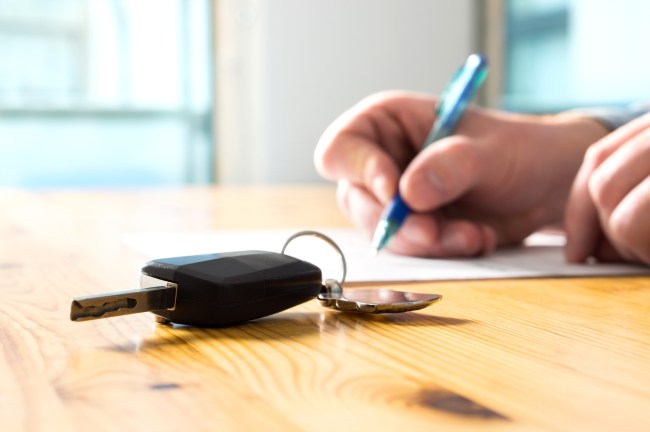
iStockphoto
April 15th is fast approaching, which means if you haven’t already, you’re going to be filing your taxes soon and might be getting a refund from Uncle Sam.
Maybe your refund will be smaller than last year, maybe it won’t. You don’t really want a refund at all, because it means you were giving the IRS an interest-free loan out of every paycheck.
If you do get a refund though, you may be looking to put that chunk of change towards a new car purchase; but should you lease or buy?
The generally agreed upon financial wisdom is that purchasing is better than leasing for one obvious and major reason: once you’ve finally paid it all off, you own an asset.
I won’t argue with this.
It’s sound financial advice.
There’s a good reason that around 66% of new car sales are purchases rather than leases, according to Experian data.
For what it’s worth, about 96% of used car sales are purchased. Leasing a pre-owned car rarely makes sense.
It’s not that simple though. Here are a few reasons why:
- Purchasing new is a more expensive endeavor. It requires a larger down payment, larger monthly payments, and a longer contractual commitment.
- New loans average 68 months versus new leases only going for 36 months.
- New loan monthly payments are $530 a month on average against leases at $430 per month.
Of course, despite financing being close to twice as long of a commitment, you can always sell a car while still making payments. It won’t always make sense to do so, but you can if you have to.
If you decide you need to get out of a lease, your options are much more limited.
For the sake of comparison, the average monthly payment on a used car is $381 per month, making it the cheapest option, at least in terms of monthly payments.
In the interest of full disclosure, I drive an older BMW, an E46. As someone who sees cars as more than just a tool to get from A to B, I wouldn’t have it any other way. I could’ve leased some cheap Korean FWD economy shitbox that would’ve worked out to less than the purchase price plus running costs of my car.
The problem is that shitbox wouldn’t have brought me any joy. So it’s money well spent in my book.
The real peril you face in buying something used is the unknown repair costs that will be added on top of the monthly payments or cash purchase price.
Best New Cars for 2019-2020
When possible your best bet will always be to go for something certified that comes with a warranty, but of course that comes at a premium.
Still, it’s easier to plan around a static monthly payment than it is to deal with an unexpected repair bill that may cost you thousands of dollars you don’t have at your disposal.
Even if you do buy certified pre-owned with a warranty, there are still no guarantees. Warranty companies are like insurance companies. Their business model is to deny as many claims as possible.
If something on your car breaks and the mechanic finds evidence of prior work that’s simply near the area of the broken part, your warranty claim will be denied, leaving you shafted by your broken driveshaft.
In these cases, you may find yourself stuck with an unexpected diagnostic fee, even if you choose not to go ahead with the repair at dealership service center prices.
It is of the utmost importance then, if you’re buying a used car, to have it thoroughly inspected before purchase. Not only for safety issues but for any signs of previous work done.
A quality car repair shouldn’t leave signs. If there is evidence that the car’s been worked on, you should view that as a major red flag.
Which brings us to leasing something new.
A leased car will be returned to the financial institution that owns it either still under warranty or around the time the warranty runs out.
If you purchase and intend on keeping the car for a while, the warranty will obviously expire. Extended warranties are available and you would be wise to foot that bill.
Of course, leasing has some big limitations.
You don’t actually own a leased car.
When you return it, the owner of the title expects their car to be in good condition so that they might resell it. If it isn’t, you’re going to get charged for balding tires, body damage, and required maintenance.
These bills can often extend into the thousands if you’ve been careless, and if you go over the allotted mileage on your contract there will be additional charges.
Word to the wise: if you’ve leased a car and gone over mileage, call the financier of your lease before returning it.
They’ll let you buy those miles at a discounted rate. You should always follow the guidelines laid out by the leasing company and get a pre-inspection done prior to turning the car in. This way, you’ll know exactly what you’re going to be charged for.
In some instances, you’ll be able to rectify the identified problems for less.
For example, buying used tires which have just enough thread to pass inspection should cost you about one-third of what you’d otherwise be charged for new ones.

iStockphoto / SeventyFour
Leasing has its advantages as well.
You can afford more car. It comes down to the residual value.
If you lease a car with a 60% residual, your monthly payments will only be for 40% of the value of the car, plus interest. If you purchase, you’re paying for 100% of the selling price, plus interest.
Often times, for a similar monthly outlay, you can buy American or lease German. If you’re like me, this is a very tempting argument.
Ultimately it comes down to your individual situation and what you’re trying to get out of your car. If you can afford it, by all means, purchase something new.
It’s a solid financial decision with a few unexpected costs that offers flexibility if you decide to change things up. Purchase in cash if you can, too, so you don’t pay interest.
That goes for new or used.
If you’ve run the numbers and feel that a new car purchase just isn’t in the cards for you, even with financing, don’t rule out leasing.
It’s a known quantity when compared to buying used and isn’t the terrible value some might make it seem. Or, take a chance and get that used sports car you had a poster of as a kid. Us car nuts do love to live dangerously.
Ultimately it comes down to your personal situation and what you value in your car.
Every option has its pros and cons.
You won’t really know if you’ve made a good or bad decision until a couple of years after the fact.
Jordan Ulman has been driving cars since before he got his license (sorry Mom and Dad). He currently works for a high-end dealership and aspires to one day own his own exotic that never works correctly.